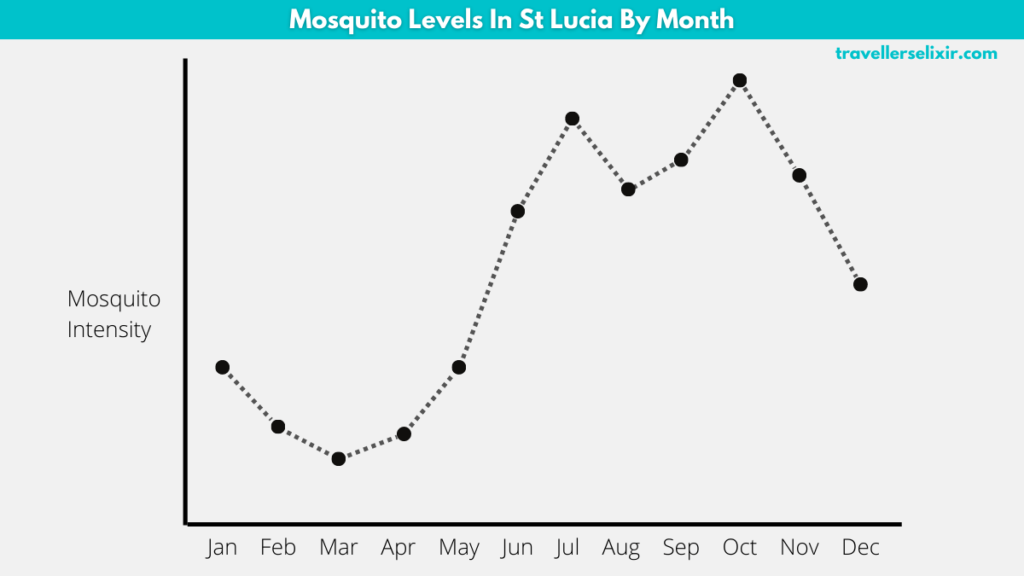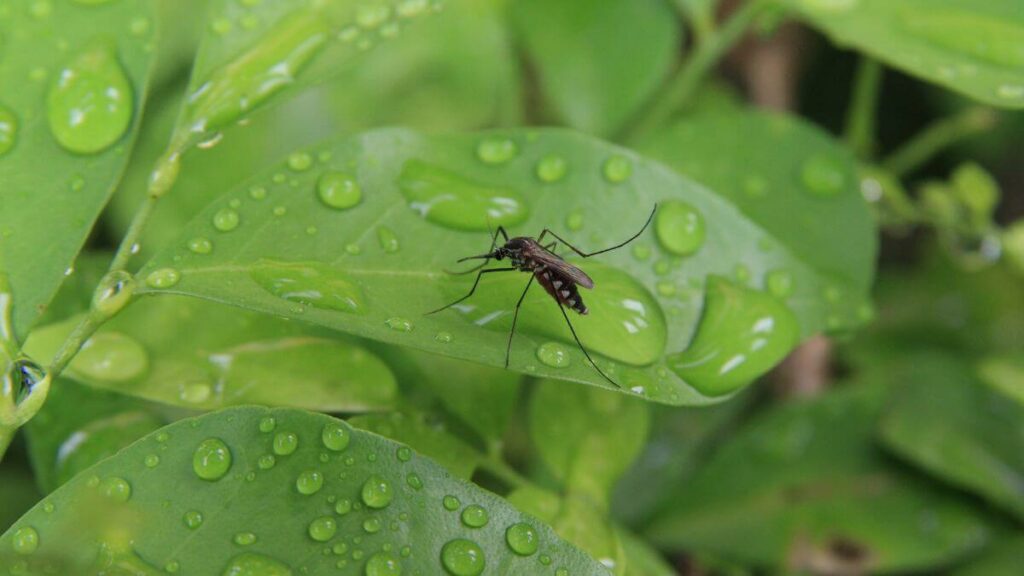Mosquitoes are super annoying and can even be dangerous so it’s always worth checking what you need to do before traveling to somewhere new.
Before visiting St Lucia, I spent hours researching this topic reading through forums and government websites. Now that I’ve visited, I’d love to share my experience with you.
This ultimate guide on bugs in St Lucia covers the types of insects you’ll find in St Lucia and how you can protect yourself.
Does St Lucia Have Mosquitos?
You will find mosquitoes in St Lucia year round. When I visited recently, I saw them all the time, especially in the evenings.
St Lucia is largely made up of a lush tropical rainforest with lots of standing water meaning it’s an ideal location for mosquitoes.
That being said, it also depends largely on where you stay. If you’re staying at one of the more fancy resorts like Sugar Beach or the Royalton then you have less to worry about.
These types of resorts will spray their entire grounds with bug spray so you won’t see many mosquitoes at all.
Most resorts also have screens or mosquito nets to keep the bugs out of your room.
I personally stayed at the Sandals Grande St Lucian and found that mosquitoes were rare on the grounds but a few did still show up. For this reason, I still wore insect repellent every day.
If you’re heading out of your resort to explore the island then you’ll need to be more careful especially if you’ll be heading into the rainforest or on a hike.
I actually did a hike up Gros Piton and the mosquitoes were rampant up there! Luckily, as I’d doused myself in insect repellent, I wasn’t bitten but my boyfriend wasn’t so lucky.
The mosquitoes are particularly present at dawn, at dusk and after a rain shower so take particular care during these times.
To compare, the mosquito situation in St Lucia is similar to most other Caribbean islands.
St Lucia’s Mosquito Season
It’s worth knowing that mosquitoes are more prevalent in St Lucia at certain times of year.
St Lucia’s mosquito season runs from June until November when the levels of mosquitoes are at their highest and you’re more likely to be bitten.
This is also the rainy season so you will experience the odd rain shower from time to time which is what attracts the mosquitoes.
Mosquitoes breed in standing water so after a heavy rainshower, mosquitoes are attracted to the water puddles that remain where they then lay their eggs.
Luckily for me, I visited in February which falls outside of the main mosquito season however I still saw a lot of mosquitoes.
Mosquitoes are way less prevalent between December and May which coincides with St Lucia’s dry season.
As there’s little rain during this time, there’s less free standing water for mosquitoes to breed in so the levels are much lower.
Check out the St Lucia mosquito season chart below:

Mosquito Borne Diseases
Although the majority of bug bites in St Lucia will just cause an annoying itchy rash, there is a small risk that they could lead to a mosquito borne disease.
Thankfully, Malaria is not present at all in St Lucia so you don’t have to worry about it.
The main mosquito borne diseases present in St Lucia are dengue fever, chikungunya virus and zika virus.
Here’s what you need to know:
- Dengue fever – can cause painful bone, joint and muscular pains as well as a flu-like fever, nausea and headaches. Most people recover within a week but it can cause serious illness.
- Chikungunya virus – can cause joint pain, fever, a rash and a headache. Clears up after a few days for most people however some people may experience swollen and painful joints for weeks or even years afterwards (super rare).
- Zika virus – Infection during pregnancy can lead to birth defects. Zika can cause a rash, itching, mild fever, a headache, muscle pains and joint pains. Most people will only experience mild symptoms.
❗️Important: If you’re pregnant then speak with your doctor before going to St Lucia. In general, it’s not recommended that pregnant people visit areas that have a risk of zika virus.
Are Bugs a Problem in St Lucia?

Based on my own personal experience, I wouldn’t say that the bugs really affected my trip.
Yes, there were a ton of bugs and I regularly saw mosquitoes but it wasn’t any worse than any other Caribbean island.
I was very careful to wear insect repellent every single day and thankfully I wasn’t bitten.
Mosquitoes are definitely your biggest concern but if you take some basic precautions then you shouldn’t have any issues.
If you wear a good insect repellent every day then you’ll likely not even notice the mosquitoes at all.
Other Insects in St Lucia
As well as mosquitoes, there are other insects present on the island including sand flies, moths, beetles, ants, flies and spiders.
You’ll likely see some insects in St Lucia (as you will in any tropical location) however it’s definitely manageable.
There are other potential animals that you might encounter on your trip to St Lucia like spiders and snakes (but these are rare).
Do I Need Mosquito Repellent?
You definitely need to wear mosquito repellent whilst in St Lucia to prevent mosquito bites.
The best mosquito repellent I’ve used is the Repel Sportsmen 40% DEET. This repellent is my holy grail as the bugs just don’t even come near you. I wore it every day in St Lucia and wasn’t bitten even once!
Bugs, like mosquitoes, can spread several diseases if they happen to bite you whilst you’re on vacation in St Lucia.
Whilst dangerous diseases, like dengue fever and zika virus, are rare, they can happen so it’s worth protecting yourself.
At a minimum you’ll be left with an itchy red bite so it’s worth preventing it if you can.
Here’s some tips on how to prevent bug bites in St Lucia:
- Cover any exposed skin by wearing long-sleeved tops and long pants.
- Use a good insect repellent (more on this below).
- Sleep in an air-conditioned room or use a mosquito net.
You can also opt to stay at one of the fancier resorts which spray their grounds regularly with insect repellent to keep the bugs at bay.
These fancy resorts also have air-conditioning in the rooms, screens to stop the bugs getting in and they will usually provide you with a mosquito net if necessary.
What Type of Insect Repellent Should I Use?
Always use an insect repellent that contains 20% or more DEET. The higher the percentage the better.
DEET is one of the most effective ingredients and is proven to prevent bug bites.
It works against both mosquitoes and ticks.
If you want something that will definitely keep the bugs away then try this bug repellent which contains 40% DEET. You’ll only need a small amount and the bugs won’t even touch you.
Also look for an insect repellent that is EPA-registered. This means that the spray is proven to be both safe and effective for everyone, including pregnant and breastfeeding women.
The insect repellent mentioned above (this one) is EPA-registered.
💡Tip: Always apply your insect repellent after your sunscreen and reapply throughout the day.
How to Deal with Bug Bites
If you do end up getting bitten, don’t worry. There’s a few things you should do:
- Avoid scratching the bite. Even though it’s tempting, this will make it worse.
- Apply a soothing cream like this one to reduce the itching. A hydrocortisone cream works best for this.
- Monitor any symptoms. The vast majority of bug bites will not harm you but make sure you seek medical attention if you get any strange symptoms.
And that’s it!
Hopefully you now know what to expect when it comes to bugs in St Lucia and how to protect yourself.
Need more help planning your St Lucia vacation?





